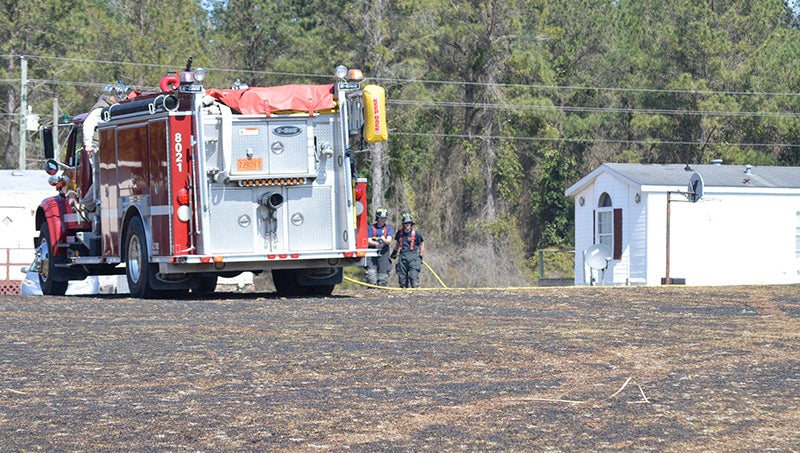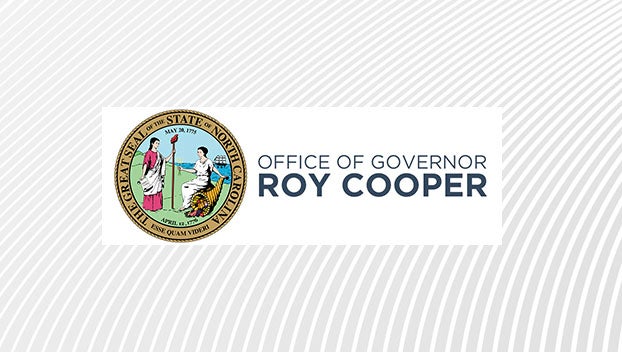Dry conditions, low humidity, wind make perfect fire conditions
Published 7:01 pm Friday, March 30, 2018

- UNDER CONTROL: Beaufort County firefighters recently responded to a fire that spread from a pile of burning yard debris to neighboring yards in a community off of Camp Leach Road. Weather conditions make debris burning especially dangerous this time of year. (Matt Debnam/Daily News)
Human carelessness leads to more wildfires than any other cause.
It’s a timely warning that comes from the N.C. Forest Service, as people clear their yards of leaves, branches and other plants that didn’t survive the winter. However, this time of year is the most dangerous time to burn debris.
“This time of year is just a dangerous time to have any type of outside fire,” said Chris Newkirk, Beaufort County’s operations chief of fire/emergency management. “Historically, some of our largest wood fires, they typically occur during this time of year, because it’s dry, there’s low humidity and (can be) high winds. … It’s a perfect recipe for fires to grow faster than we anticipate and spread faster than we think.”
Newkirk said when his office hears about a wildfire, it’s usually because of two reasons: someone walks away from a fire that then spreads rapidly or they’re burning debris not included in the permit.
“The biggest risk is leaving any fire unattended. That’s typically where we run into most of our problems. They thought it all burned downed or think that once the flames aren’t as high, they can walk away,” Newkirk said.
Newkirk said sometimes people aren’t aware that the burn permit they received from the state forestry service applies to yard debris from that yard only — it does not allow for burning of trash or construction debris.
“Scrap building materials — that’s a different fuel load than yard debris, particularly shingles and vinyl siding,” Newkirk said.
The N.C. Forest Service encourages anyone who is thinking about burning debris to contact the county forest ranger first for technical and safety advice, as well as follow these tips:
- Consider alternatives to burning. Some yard debris, such as leaves and grass, may be more valuable if composted.
- Check with your county fire marshal’s office for local laws on burning debris.
- Make sure you have an approved burning permit, which can be obtained at any NCFS office, county-approved burning permit agent or online at http://ncforestservice.gov.
- Check the weather. Don’t burn if conditions are dry or windy.
- Only burn natural vegetation from your property. Burning household trash or any other man-made materials is illegal. Trash should be hauled away to a convenience center.
- Plan burning for the late afternoon when conditions are typically less windy and more humid.
- If you must burn, be prepared. Clear a perimeter around the burn area of flammable materials.
- Keep fire tools ready. To control the fire, you will need a hose, bucket, a steel rake and a shovel for tossing dirt on the fire.
- Never use flammable liquids such as kerosene, gasoline or diesel fuel to speed burning.
- Stay with your fire until it is completely out.
- These same tips hold true for campfires and barbeques, too. Douse burning charcoal briquettes or campfire thoroughly with water. When the coals are soaked, stir them and soak them again. Be sure they are out cold and carefully feel to be sure they are extinguished. Never dump hot ashes or coals into a wooded area.
- Burning agricultural residue and forestland litter: In addition to the guidelines above, a fire line should be plowed around the area to be burned. Large fields should be separated into small plots for burning one at a time. Before doing any burning in a wooded area, contact your county ranger, who will weigh all factors, explain them and offer technical advice.
- Most importantly, do not walk away from a fire, even if only for a moment, Newkirk said.
“Sometimes people, all they did was went inside to get a drink, used the restroom, just stepped away for a moment and came back,” he said. “This time of year, into May and then the fall, when we start to dry back out, are always dangerous. … I really just can’t stress enough the importance of not leaving fires unattended.”





